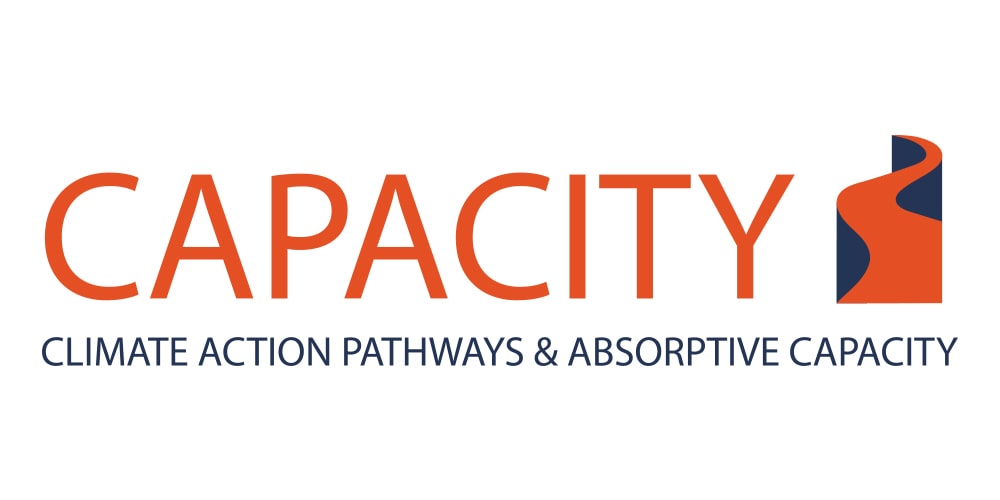
CAPACITY (Climate Action Pathways & Absorptive Capacity)

- Title
-
CAPACITY (Climate Action Pathways & Absorptive Capacity)
- Start Date
-
December 2022
- End Date
-
December 2027
- Project Phase 1:
-
(2018-2022)
- Funding Body
-
Department of Environment, Climate and Communications
- Coordinator
- Principal Investigators
- Research Area
Introduction
The 2015 Paris Agreement contains a commitment to “Holding the increase in the global average temperature to well below 2°C above pre-industrial levels and pursuing efforts to limit the temperature increase to 1.5°C above pre-industrial levels”. Ireland, like most other countries, has ratified the Paris Agreement. Adhering to Paris Agreement temperature goals will require “global peaking of greenhouse gas emissions as soon as possible… rapid reductions thereafter … so as to achieve a balance between anthropogenic emissions by sources and removals by sinks of greenhouse gases in the second half of this century”. Despite this high-level commitment, a clear and detailed pathway that would align Ireland with the Paris Agreement goals has yet to be developed and agreed.
Energy system models can support the exploration, development, decision-making and governance of long-term pathways consistent with the long-term Paris Agreement goals. The Energy Policy and Modelling Group at MaREI have developed a suite of energy modelling tools together with an internationally recognized expertise in their development and usage. The CAPACITY project will further develop and update these tools to facilitate insights and robust decision making about the appropriate long-term decarbonisation pathway for Ireland. The CAPACITY project will also work closely with policy-makers in Ireland to enhance the absorptive capacity of the governance system to utilise the insights from these energy modelling tools.
Work Packages
WP1 Optimisation Modelling
The further development and maintenance of the Irish TIMES integrated energy systems optimisation model for Ireland. The model will be used to generate the least cost future energy system pathways subject to technology, policy, economic and resource constraints. It will explore the impacts on the energy system and on the economy of different levels of ambition for greenhouse gas emissions reduction and for renewable energy ambition over different time horizons, including using scenario analysis to identify least-cost energy systems pathways to meet national ambitions for 2030 and 2050 for greenhouse gas emissions reductions; decarbonisation pathways for the electricity, heat and transport sectors, and deployment scenarios for energy efficiency and for renewable energy.
WP2 Policy Simulation Modelling
The further development and maintenance of the national (multi-sectoral) LEAP-IE energy demand and supply simulation model. This will improve the evidence basis available to policymakers on the role and effectiveness of policy measures in delivering improvements in energy efficiency, renewable energy and greenhouse gas emissions reductions. It will also increase the understanding of the effectiveness of policy measures in the delivery of agreed targets, including within the non-ETS sectors of car transport, freight, residential energy efficiency, as well as economy-wide efficiency measures.
WP3 Integrated electricity and gas systems modelling
The development and maintenance of a PLEXOS-EU model of Ireland’s and Europe’s electricity and gas systems for 2020, 2030 and 2050. This will involve (for example) undertaking electricity and gas systems modelling scenario analysis to inform energy and climate action policy through understanding the impacts of different levels of renewable electricity and of electric vehicles on the power system and on the electricity market; it will also involve increasing our understanding of the role of natural gas and renewable gas in meeting Ireland’s ambitions for improving energy efficiency and reducing greenhouse gas emissions.
WP4 Engagement
The team will also engage with key Department and State Agencies with responsibilities for energy and climate action policy. This work will focus on increasing absorptive capacity within Government Departments in the use of and insights from climate and energy modelling tools.
Policy Briefs
The role of carbon budgets in translating the Paris Agreement into national climate policy – Jason Mc Guire, Fionn Rogan, Hannah Daly, James Glynn, Olexandr Balyk and Brian Ó Gallachóir
Emissions Reduction in Transport (MaREI Submission to Oireachtas Committee on Climate Action)
Carbon Budgets 2021-2030: A bridge from climate ambition to climate action
Ireland’s Carbon Budgets and EU 55% target
How could working from home contribute to Ireland’s 2030 climate target?
Resources
Working Paper – How feasible is unprecedented- Modelling diffusion pathways for ambitious climate policy targets – Tomás Mac Uidhir *, Brian Ó Gallachóir, John Curtis, Fionn Rogan
Infographic – WHAT IS A CARBON BUDGET?
Presentation – Collaborative research for co-production of climate mitigation policy (Presentation at Royal Irish Academy – Better Together Co-Production Symposium (June 3rd, 2021)
Presentation – Electricity and Climate Change (Presentation at EirGrid Deliberative Dialogue Session on 70% Renewable Electricity by 2030 (May 18th, 2021)
O’Riordan, V., Rogan, F., Ó Gallachóir, B., Mac Uidhir, T. and Daly, H.E., 2021. How and Why We Travel – Mobility Demand and Emissions from Passenger Transport (Working Paper)
Hiring
Research Support Officer – CAPACITY
Post-Doctoral Researcher/Senior Post-Doctoral Researcher – CAPACITY
Contact
Fionn Rogan – ei.ccu@nagor.f

Meet Our Team
MaREI has over 200 researchers across 13 partner institutes in Ireland working with 75 industry partners focussing on the energy transition, climate action and the blue economy. MaREI delivers excellent research with societal impact by supporting industry, informing policy and empowering society.
View

